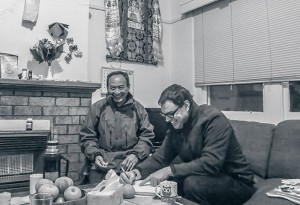Tibetan refugee harbours hopes for his children

Tibetan Refugee Gyalsten with his volunteer tutor Glen.
Forced into brutal slave labour at 12 and separated forever from his parents, Tibetan refugee Gyaltsen Yeshi is now content to see his own children prosper in safety.
“My childhood was very hard,” he said this week at his home in Melbourne’s inner west.
“My father protested for Tibet’s freedom, so the Chinese locked him up. He was 45 when he went in to prison, when he got out he was 67,” Mr Yeshi said.
He said the communist government confiscated the family’s home and possessions.
“We were left with nothing and my father in prison for 22 years,” he said.
From the age of 12, Mr Yeshi was forced into slave labour, building roads and houses.
The now 68-year-old said the heavy labour from such a young age left him with long-term injuries to his hands and joints.
“There were no machines, so we had to do it all by hand, mixing cement to build houses,” he said.
“I didn’t have enough food to eat or clothes to wear.”
Fleeing to India in 1990, Mr Yeshi met his wife Tsepak, and spent 24 years there in exile.
He received a job with the Dalai Lama security office.
In the 1990s he said his mother was thrown into a fire by Chinese government officials and spent the rest of her life unable to walk.
“The Dalai Lama told me not to go back, it is a risk, and it is better to stay here,” he said.
“I came here with my two children so they can have a better life.”
The family arrived in Australia last year after receiving a humanitarian visa, through Australia’s offshore program.
“Here it is very cold, but I feel very comfortable because it is free,” he said.
After spending some time in Werribee, they are now settled in Melbourne’s inner west.
Mr Yeshi is also receiving English lessons through AMES and a volunteer tutor.
“When I came to Footscray I felt good, because there are a lot of other refugees here,” he said.
“I feel very thankful to the Australian Government, and I request that the Australian Government accept more refugees, they have a lot of problems.”
Helen Matovu-Reed
AMES Staff Writer












